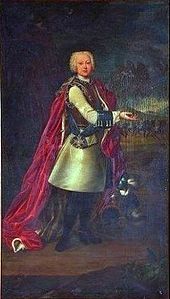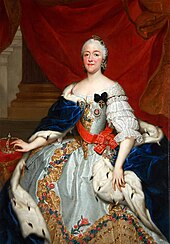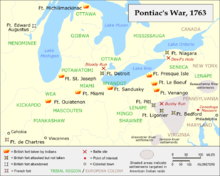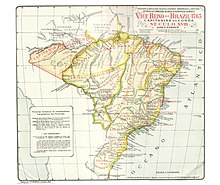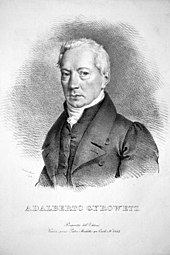1763
Portal history | Portal Biographies | Current events | Annual calendar
◄ |
17th century |
18th century
| 19th century
| ►
◄ |
1730s |
1740s |
1750s |
1760s
| 1770s
| 1780s
| 1790s
| ►
◄◄ |
◄ |
1759 |
1760 |
1761 |
1762 |
1763
| 1764
| 1765
| 1766
| 1767
| ►
| ►►

| 1763 | |
|---|---|
| The Seven Years' War ends with the Peace of Hubertusburg . | The Royal Proclamation of 1763 limited the settlement area in the British colonies in North America . |
| Several Indian tribes rise in the Pontiac revolt against British colonial rule in North America. | |
| 1763 in other calendars | |
| Armenian calendar | 1211/12 (turn of the year July) |
| Ethiopian calendar | 1755/56 (turn of the year 11/12 September) |
| Bengali solar calendar | 1168/69 (beginning of April 14th or 15th) |
| Buddhist calendar | 2306/07 (southern Buddhism); 2305/06 (alternative calculation according to Buddha's Parinirvana ) |
| Chinese calendar | 74th (75th) cycle
Year of the water sheep癸未 ( at the beginning of the year water horse 壬午) |
| Chula Sakarat (Siam, Myanmar) / Dai calendar (Vietnam) | 1125/26 (turn of the year April) |
| Dangun era (Korea) | 4096/97 (October 2/3) |
| Iranian calendar | 1141/42 (around March 21) |
| Islamic calendar | 1176/77 (July 11-12) |
| Jewish calendar | 5523/24 (September 7/8) |
| Coptic calendar | 1479/80 (September 11-12) |
| Malayalam calendar | 938/939 |
| Seleucid era | Babylon: 2073/74 (turn of the year April)
Syria: 2074/75 (turn of the year October) |
| Vikram Sambat (Nepalese Calendar) | 1819/20 (turn of the year April) |
In 1763 the Seven Years' War ended with the Peace of Paris and the Peace of Hubertusburg . The big loser in this war is France , which is losing almost all of its previous colonies, especially New France in North America. For Frederick the Great , however, the peace treaty was a triumph with which Prussia established itself as a new great power in Europe.
The Kingdom of Great Britain , which was also one of the winners of the war, quickly ran into problems in the North American colonies that France had taken over . An uprising broke out there under the chief Pontiac , which brought the new colonial empire to the brink of defeat. British King George III tries to restore peace with the Indians by restricting settlement, but the Royal Proclamation of 1763 is largely ignored by the English settlers.
In Eastern Europe ends with the death of August III. the personal union of Saxony-Poland . While an Interrex is being used in Poland-Lithuania until a new king is elected, August's son Friedrich Christian succeeds the throne in the Electorate of Saxony , who drives the rétablissement of the war-ravaged state developed by Thomas von Fritsch .
Events
Politics and world events
Seven Years War
Great Britain / Portugal and France / Spain sign the Paris Peace on February 10th and end their acts of war during the Seven Years' War . The peace treaty grants Great Britain Florida , which was until then Spanish , which is divided into the colonies of East and West Florida . In return, Spain regained control of Cuba , which was under British control after the siege of Havana , and began there on November 4th on the instructions of King Carlos III. with the construction of the fortress San Carlos de La Cabaña . 4,000 Mexican slaves abducted from the Yucatán peninsula are used as construction workers.
France must cede Canada and the areas east of the Mississippi and around the Great Lakes to the British Crown. In addition, it must compensate Spain with its areas west of the Mississippi ( Louisiana ) for the loss of Florida. France also loses its African colony Senegambia and its Indian possessions with the exception of a few trading bases, including Pondicherry and Karikal .
On February 15 signed Prussia , Elector of Saxony and Austria the treaty of hubertusburg with which the Seven Years' War is permanently discontinued. The peace treaty consists of two peace treaties: In the treaty between Prussia and Austria, Maria Theresa waives, for herself and her heirs, all territorial claims against Prussia for the areas ceded after the First Silesian War without compensation . The possession of Silesia and the County of Glatz is thus finally confirmed to Prussia. Frederick II, for his part, undertook to waive any compensation for losses during the war. In addition, in a secret supplementary agreement, he undertakes to give Maria Theresia's son Joseph his Brandenburg vote for the upcoming king's election. In the second treaty between Prussia and Electoral Saxony, the status quo before the war is restored.
Great Britain
- April: John Stuart, 3rd Earl of Bute , resigns as Prime Minister of the United Kingdom . He is succeeded by George Grenville .
- April 23 : In an edition of North Briton , Rep . John Wilkes referred to King George III's speech . on the occasion of the opening of parliament as a "lie". Shortly afterwards, a blanket warrant was issued on him and the newspaper's editors. The political affair will drag on for many years.
Saxony / Poland
With the death of the Polish king August III. , who as Friedrich August II was also Elector of Saxony , the personal union of Saxony-Poland expires on October 5th . For Poland-Lithuania , Primate Władysław Aleksander Łubieński will act as Interrex until a new king is elected . August's son Friedrich Christian becomes Elector of Saxony. One of his first acts was the dismissal of the controversial Prime Minister Heinrich von Brühl . The Restoration Commission under Thomas von Fritsch , which has been meeting since the previous year, will present its final report on November 19 , with a plan on how the disrupted state finances of Saxony will be reorganized and the war-ravaged and plundered country should be given new impetus through economic reconstruction. The so-called rétablissement will be implemented consistently and successfully over the next few years.
After only 74 days Government dies Friedrich Christian , however, already on December 17 to the smallpox . His underage son Friedrich August III will be his successor as Elector of Saxony . under the tutelage of his mother Maria Antonia von Bayern as regent and his uncle Franz Xaver as spa administrator. They continue the rétablissement of its predecessor.
Russia
- July 22nd : Russia's Empress Catherine II issues an invitation manifesto for foreign settlers , promising freedom of religion, exemption from military service, self-government at the local level with German as the language, financial start-up aid and 30 years of tax exemption.
- Catherine II of Russia had the Mosdok fortress built in the Caucasus , the first fortification of the later Caucasian line .
Other events in Europe
- April 19 : After the death of Marco Foscarini on March 31 will Alvise Mocenigo IV. In the first ballot unanimously elected doge of Venice selected. During his reign, the republic's rapid decline, its loss of power within the European powers and the stagnation of its economy continued.
- July 5th : Emmerich Joseph von Breidbach zu Bürresheim becomes Archbishop of Mainz and thereby also elector . He succeeds Johann Friedrich Karl von Ostein , who died on June 4th .
- After asking for it several times, Ricardo Wall receives from King Charles III. the dismissal as Spanish Minister of State. He is succeeded by Jerónimo Grimaldi .
- Because of alleged irregularities in his office as sackmaster, at the instigation of Joseph Rudolf Valentin Meyer , who leads a private feud against the Schumacher family , Jost Niklaus Joachim Schumacher is declared forfeit of his honor and offices and has to leave Lucerne . His relative Franz Plazid Schumacher also has to leave the city with his family. When Jost's son Lorenz Plazid Schumacher , who is in Vienna, learns of his father's banishment, he returns to Lucerne , contrary to his father's advice .
Asia
- Spring: Under the impression of the British invasion of the Philippines and the subsequent Palaris uprising , Diego Silang from the Ilokano people leads another revolt against the Spanish colonial rulers . However, he was shot dead by a friend in his own home on May 28th . His wife Gabriela Silang continues the revolution, but is captured on September 20 in a raid on a Spanish army camp and hanged the same day.
- November 29th : Hsinbyushin becomes ruler of the Burmese kingdom of Ava after the death of his brother Naungdawkyi . The king from the Konbaung dynasty currently resides in the capital Sagaing .
British colonies in North America
- April 27 : Ottawa war chief Pontiac calls on several Algonquin tribes to fight the British after the British began to systematically build settlements and fortifications in their area following the Seven Years' War . The Indians receive vague pledges of support from French hunters and traders.
- May 7th : The Pontiac uprising begins with an attack on Fort Detroit , a great Indian revolt against British colonial rule. Neither Fort Detroit nor Fort Pitt can be captured. The Indians, on the other hand, have success at Fort Sandusky ( Ohio ) (captured on May 16), Fort St. Joseph ( Michigan ) (May 25), Fort Miami (now Fort Wayne , Indiana ) (May 27), Fort Michilimackinac, Michigan (June 4), Fort Ouiatanon (near Lafayette , Indiana) (July 1), Fort Presque Isle (now Erie , Pennsylvania) (June 16), and Fort Le Boeuf (now Waterford , Pennsylvania), the on June 19th. Members of the Seneca , the only members of the Iroquois people to take part in the uprising, conquer Fort Venango (Pennsylvania) and burn it down.
- May / June: At the suggestion of General Jeffrey Amherst , the British use blankets contaminated with smallpox to decimate the Indians with an epidemic. It is one of the first documented attempts at biological warfare , but it remains unsuccessful.
- October 7 : The Royal Proclamation of 1763 restricted the settlement area in France after winning the French and Indian War acquired British colonies in North America . The proclamation is largely ignored by British settlers.
- October 12 : Potawatomi , Anishinabe and Wyandot make peace with the British.
- October 30th : Pontiac breaks siege of Fort Detroit.
South American colonies
- January 27 : Rio de Janeiro replaces Salvador da Bahia as the capital of the Portuguese viceroyalty of Brazil .
- February 23rd : Under the leadership of Cuffy , a slave rebellion begins in the colony of Berbice (now part of Guyana ), which belongs to Dutch Guiana and is owned by the Dutch West India Company .
- May 13th : After the slaves were defeated in a battle against the Dutch colonial masters , internal fighting broke out in the slave army. Cuffy is subject to his previous deputy Akara and commits suicide. The slave revolt is put down by Governor van Hogenheim in December.
economy
- March 2 : The intelligence and newspaper newspaper of Hessen published by Georg Christoph Mohr and Jakob Maximilian Stirn appears for the first time in Hersfeld . It will stop being published on December 25th .
- May 14 : German monetary history before 1871 : Electoral Saxony and the Ernestine principalities introduce the convention mint for their area .
- May 25th : Johann Anton Lucius receives citizenship as an independent businessman in Erfurt. In the same year he founded the textile company Joh. Anton Lucius and started trading in cotton goods .
- July 13 : The Royal Danish Agricultural Academy is founded.
- August 29 : The first Kassel trade fair opens in the Berlepschen Haus .
- September 9th : Carl Gottlob Beck founds the later publishing house CH Beck in Nördlingen and expands his print shop to include a bookshop .
- September 19 : Frederick the Great founds the Königliche Porzellan-Manufaktur Berlin .
- The trading house Löbbecke from Iserlohn opens a branch in Braunschweig .
science and technology
- By decree of 15 October Elector donates Karl Theodor of the Palatinate , at the suggestion of the Alsatian scholar Johann Daniel Schöpflin the Kurpfälzische Academy of Sciences , based in Mannheim . The inaugural meeting will take place on October 20th and will be opened by the Elector Palatine High Court Master Karl Anton Hyacinth von Gallean on behalf of the Elector.
- The Austrian physician and naturalist Giovanni Antonio Scopoli leading the first description of the beetle hermit by.
- The French astronomer Nicolas Louis de Lacaille divides the ancient constellation Argo Navis into three separate constellations: the aft deck of the ship ( Puppis ), the sail of the ship ( Vela ) and the keel of the ship ( Carina ).
- Astronomer Charles Mason and geometer Jeremiah Dixon begin surveying the border between the colonies of Pennsylvania and Maryland over border disputes . The survey will last until 1767 , the Mason-Dixon Line is still the border between the two states today.
Culture
| Culture | |
|---|---|
|
- April 6 : The Palais Royal , seat of the Paris Opera , burns down completely.
- June 9th : Leopold Mozart goes on another concert tour through Europe with his children Wolfgang and Nannerl .
- The first version of Carlo Goldoni's prose comedy Il Ventaglio ( The Fan ) premieres in Paris. Since she did not have the expected success in the foreign environment for various reasons, Goldoni revised her over the next two years.
- The engraver John Spilsbury from England sticks map prints onto thin mahogany boards . He then saws them up and offers them as a "teaching aid to facilitate geography lessons". His product is the preliminary stage to the puzzle .
society
- August 12th : The Königlich-Prussische-General-Landschul-Reglement sets the duration of school time in the elementary school at eight years.
religion
- The Auxiliary Bishop of Trier, Johann Nikolaus von Hontheim, calls for a Catholic, German national church in the book De statu ecclesiae et legitima potestate Romani pontificis liber singularis , written under the pseudonym "Justinus Febronius", thus establishing Febronianism . The work that he dedicated to the Pope himself, in which, however, he criticized the position of the Pope himself, was placed on the Index Librorum Prohibitorum and burned the following year .
- The Salvatorian Monastery of Gottesberg is founded.
Sports
The first known ice skating competition is held in the Fens of Cambridgeshire . Participants are two runners from the English nobility, the winner receives prize money of 10 guineas . The run is reported to be around 15 miles long and it will take the winner 46 minutes. The Fen Skating competitions developed from this and continued until around 1890 .
Historical maps and views
Born
January to March
- January 1 : Leopold Wilhelm von Dobschütz , Prussian cavalry general, military governor of the Rhine provinces and of Breslau († 1836 )
- January 3 : Joseph Fesch , French cardinal († 1839 )
- January 8 : Jean-Baptiste Drouet , French postmaster and revolutionary († 1824 )
- January 8 : Edmond-Charles Genêt , French diplomat († 1834 )
- January 15 : François-Joseph Talma , French actor († 1826 )
- January 16 : Franz von Walsegg , Austrian nobleman and hobby composer, client for Mozart's Requiem († 1827 )
- January 21 : Augustin Robespierre , politician during the French Revolution († 1794 )
- January 22nd : Johann Gabriel von Chasteler , Austrian general († 1825 )
- January 24 : Alexandre Andrault de Langeron , Russian General, Governor of Crimea and Governor General of New Russia († 1831 )
- January 26th : Jean-Baptiste Bernadotte , French general and as Charles XIV. John King of Sweden and Norway († 1844 )
- January 29 : Johann Gottfried Seume , German writer and poet († 1810 )
- February 1 : José Cienfuegos , Spanish officer, governor of Cuba and minister of war of Spain († 1825 )
- February 9 : Buckner Thruston , American politician († 1845 )
- February 14 : Jean-Victor Moreau , French general († 1813 )
- February 14 : Johann Martin Usteri , Swiss poet († 1827 )
- February 19 : Adalbert Gyrowetz , Austrian composer († 1850 )
- March 2 : Joseph von Utzschneider , German technician († 1840 )
- March 3 : Georg Christian Benedikt Ackermann , German theologian, educator, pastor and court preacher († 1833 )
- March 6 : Jean-Xavier Lefèvre , Swiss composer and music teacher († 1829 )
- March 9 : William Cobbett , English writer († 1835 )
- March 10th : Johann Christoph Arnold , Saxon publisher, bookseller and local politician († 1847 )
- March 12 : Martin Chittenden , American politician († 1840 )
- March 13 : Guillaume-Marie-Anne Brune , Marshal of France († 1815 )
- March 15 : Georg Ludwig Collins , German Protestant clergyman († 1814 )
- March 15 : James Wilson , American farmer and manufacturer of globes († 1855 )
- March 18 : Friedrich Gottlob Hayne , German botanist, pharmacist and university professor († 1832 )
- March 20 : Christian Karl André , German educator and farmer († 1831 )
- March 21 : Jean Paul , German writer († 1825 )
- March 22nd : Franz Ferdinand von Druffel , professor of medicine in Münster, reviewer from Anna Katharina Emmerick († 1857 )
- March 23 : Fyodor Wassiljewitsch Rostoptschin , Russian general and minister († 1826 )
- March 28 : Eberhard Ernst Gotthard von Vegesack , Swedish general († 1818 )
April to July
- April 7th : Domenico Dragonetti , Italian double bass player and composer († 1846 )
- April 21 : François Athanase de Charette de la Contrie , French naval officer († 1796 )
- April 22nd : Magdalena Margaretha Tischbein , German flower painter († 1846 )
- April 25 : Isaac Wilbour , American politician († 1837 )
- May 6 : Johan David Åkerblad , Swedish diplomat, paleographer and orientalist († 1819 )
- May 7 : Józef Antoni Poniatowski , Polish general, Marshal of France († 1813 )
- May 10 : Johann Gottlieb Blümner , German civil servant († 1837 )
- May 15 : Franz Danzi , German composer († 1826 )
- May 16 : Louis-Nicolas Vauquelin , French pharmacist and chemist († 1829 )
- May 17 : Pierre-Auguste Adet , French doctor and chemist († 1834 )
- May 20 : William Wellesley-Pole , Irish-British naval officer, politician, mint master and postmaster general († 1845 )
- May 24 : Robert Adair , English diplomat († 1855 )
- May 24th : Pierre-Gaspard Chaumette , French revolutionary († 1794 )
- June 1 : Antonio Dall'Occa , Italian double bass player († 1846 )
- June 13 : José Bonifácio de Andrada e Silva , Brazilian mineralogist and statesman († 1838 )
- June 15 : Kobayashi Issa , Japanese haiku poet († 1828 )
- June 14 : Johann Simon Mayr , German composer and music teacher († 1845 )
- June 22nd : Étienne-Nicolas Méhul , French composer († 1817 )
- June 23 : Justus Arnemann , German medical professor and surgeon († 1806 )
- June 23 : Joséphine de Beauharnais , French empress, wife of Napoleon Bonaparte († 1814 )
- July 2 : Peter Ritter , German composer, conductor and cellist († 1846 )
- July 15 : Roger Hale Sheaffe , British general († 1851 )
- July 17th : Johann Jakob Astor , German emigrant, richest man of his time in America († 1848 )
- July 22nd : Johann Heinrich Ramberg , German painter and draftsman († 1840 )
August to December
- August 8 : Charles Bulfinch , American architect († 1844 )
- August 15 : Ernst Friedrich Ferdinand Robert , German painter and university professor († 1843 )
- August 16 : Frederick Augustus, Duke of York and Albany , British field marshal, Prince-Bishop of Osnabrück († 1827 )
- August 24 : Johannes Amon , German composer and music publisher († 1825 )
- August 31 : Andreas Stanislaus von Hatten , Bishop of Warmia († 1841 )
- September 2 : Caroline Schelling , German writer ("femme de lettres") († 1809 )
- September 11th : Ignácz Gyulay , Field Marshal, President of the Austrian Court War Council and Feldzeugmeister († 1831 )
- September 24 : Christian Ludwig Bachmann , German doctor and music writer († 1813 )
- September 24 : Ezra Butler , American politician († 1838 )
- September 28 : Johannes Schulthess , Swiss Protestant clergyman and university professor († 1836 )
- September 30th : Joseph von Baader , Bavarian engineer († 1835 )
- October 2 : Thaddäus Müller , Swiss theologian († 1826 )
- October 7th : Erhard Adolf Matthiessen , German lawyer, businessman and councilor († 1831 )
- October 15 : Tani Bunchō , Japanese painter and poet († 1841 )
- October 15 : Johann Georg Tralles , German mathematician and physicist († 1822 )
- October 20 : Joachim Perinet , Austrian actor and writer († 1816 )
- October 27 : William Maclure , Scottish geologist, scholar and philanthropist († 1840 )
- October 29 : Johann Jakob Meyer , Swiss officer and politician († 1819 )
- October 30 : Heinrich Cotta , Thuringian forest scientist († 1844 )
- October 30 : Georg Karl von Sutner , German civil servant († 1837 )
- October 31 : Wilhelm Arnold Günther , German auxiliary bishop († 1843 )
- November 1 : Herbord Sigismund Ludwig von Bar , German lawyer, civil servant and member of parliament († 1844 )
- November 7th : Friedrich August von Staegemann , German politician († 1840 )
- November 10 : František Martin Pecháček , Czech composer († 1816 )
- November 14 : Stanley Griswold , American politician († 1815 )
- November 24th : Charles Meynier , French painter († 1832 )
- November 25 : Germain-Jean Drouais , French painter († 1788 )
- November 29 : Andreas Florian Meilinger , German philosopher and Benedictine monk († 1837 )
- December 2 : Claude-Antoine Prieur , French politician, officer and scientist († 1832 )
- December 6 : Diderich Hegermann , first Norwegian Minister of War († 1835 )
- December 9 : Nikolaus von Flüe , Swiss officer in the French service and governor († 1839 )
- December 13 : Georg Dubislav Ludwig von Pirch , Prussian Lieutenant General († 1838 )
- December 23 : Georg Joseph Beer , founder of scientifically based ophthalmology († 1821 )
Exact date of birth unknown
- Marcos Coelho Neto , Brazilian composer († 1823 )
- George Walker , American politician († 1819 )
Died
First half of the year
- January 2 : John Carteret, 2nd Earl Granville , English statesman (* 1690 )
- January 3 : Josep Antoni Martí , Spanish composer (* 1719 )
- January 11th : Caspar Abel , German historian and poet (* 1676 )
- January 11 : Giovanni Benedetto Platti , Italian oboist and composer (* around 1697 )
- January 13th : Johann Michael Hartung , German master organ builder (* 1708 )
- January 27th : Anton Ulrich , Duke of Saxony-Meiningen (* 1687 )
- January 29 : Johan Ludvig , Danish Chancellor, art and literature collector (* 1694 )
- January 29th : Louis Racine , French poet (* 1692 )
- February 12 : Pierre Carlet de Marivaux , French writer (* 1688 )
- February 26th : Friedrich , Margrave of Brandenburg-Bayreuth (* 1711 )
- March 20 : Maximilian Hellmann , Austrian cymbalist, timpanist and composer (* 1702 )
- March 23 : Franz Guasco , Austrian Feldzeugmeister (* 1711 )
- March 30th : Ridolfino Venuti , Italian antiquarian, archaeologist, numismatist and art historian (* 1705 )
- March 31 : Marco Foscarini , 117th Doge of Venice (* 1696 )
- April 2 : Johann Georg Bschorer , German sculptor (* 1692 )
- April 4 : Richard Mudge , English pastor and composer (* 1718 )
- April 7 : Benedykt Chmielowski , Polish priest and encyclopaedist (* 1700 )
- before April 9th: Georg Christoph Sturm , German architect and first Brunswick court architect (* 1698 )
- April 13 : Christian Zell , German harpsichord maker (* around 1683 )
- April 16 : Paul Wilhelm Schmid , German legal scholar (* 1704 )
- April 18 : Franz Anton Bustelli , Swiss sculptor and modeler (* 1723 )
- April 24 : Charles-Étienne Pesselier , French author, poet, Fermier général and encyclopedia (* 1712 )
- April 27 : Johann Georg Üblhör , German plasterer and sculptor (* 1703 )
- May 3 : George Psalmanazar , French impostor (* 1679 )
- May 11 : Natalja Fyodorovna Lopuchina , Baltic governor's daughter at the Russian court (* 1699 )
- May 20 : Georg Sebastian Urlaub , Franconian painter (* 1685 )
- May 24th : Friedrich Karl von Hardenberg , Hanoverian diplomat, war president and garden architect (* 1696 )
- May 28 : Jacob Hochbrucker , German harpist, plucked instrument maker, violin maker and lute maker (* around 1673 )
- May 28 : Diego Silang , Filipino insurgent (* 1730 )
- June 1 : Johann Caspar Vogler , German organist and composer (* 1696 )
- June 4th : Johann Friedrich Karl von Ostein , Archbishop and Elector of Mainz and Bishop of Worms (* 1689 )
- June 15 : Joseph Maria von Thun and Hohenstein , Bishop of Gurk and Prince-Bishop of Passau (* 1713 )
- June 29th : Hedvig Charlotta Nordenflycht , Swedish poet (* 1718 )
Second half of the year
- July 11 : Peter Forsskål , Swedish / Finnish naturalist and orientalist (* 1732 )
- July 16 : Jacques-Martin Hotteterre , French composer and flautist (* 1674 )
- August 9 : Johann Daniel Hardt , German gambist and composer (* 1696 )
- August 12 : Olof von Dalin , Swedish poet, writer, satirist and historian (* 1708 )
- August 12 : Peter Gerwin von Franken-Siersdorf , Vicar General in the Archdiocese of Cologne (* 1702 )
- August 14 : Giovanni Battista Somis , Italian violinist and composer (* 1686 )
- August 29 : Georg Wilhelm Bauernfeind , German draftsman and engraver (* 1728 )
- September 12 : Johann Joseph Couven , German architect and builder of the Baroque (* 1701 )
- September 14th : Johann Philipp Sack , German composer and keyboard player (* 1722 )
- September 20 : Gabriela Silang , Filipino insurgent (* 1731 )
- September 26 : John Byrom , English writer (* 1692 )
- October 5th : August III. , King of Poland and Grand Duke of Lithuania, as Friedrich August II. Elector of Saxony (* 1696 )
- October 11 : Maria Anna Victoria , niece and chief heiress of Prince Eugene of Savoy (* 1683 )
- October 22 : Frans van Mieris the Younger , Dutch genre and portrait painter and etcher (* 1689 )
- October 26 : Johann Moritz Gustav von Manderscheid-Blankenheim , Bishop in the Diocese of Wiener Neustadt and in the Archdiocese of Prague (* 1676 )
- October 27 : Lorenz Natter , German gemstone cutter, gem cutter and medalist (* 1705 )
- October 28 : Heinrich Graf von Brühl , Prime Minister of Saxony (* 1700 )
- November 10 : Joseph François Dupleix , French Governor General in India (* 1697 )
- November 23 : Antoine-François Prévost , French writer (* 1697 )
- November 23 : Friedrich Heinrich von Seckendorff , Imperial Field Marshal and diplomat (* 1673 )

- November 27th : Isabella of Bourbon-Parma , Princess of Bourbon-Parma and Archduchess of Austria (* 1741 )
- November: Giovanni Claudio Pasquini , Italian poet and librettist (* 1695 )
- December 9 : Ludwig von Aulack , Prussian lieutenant colonel (* 1706 )
- December 9 : Christian Gottlieb Buder , German lawyer, historian and librarian (* 1693 )
- December 13 : Giuseppe Maria Buonaparte , Corsican politician and grandfather of Napoleon I (* 1713 )
- December 17th : Friedrich Christian , Elector of Saxony (* 1722 )
- December 17th : George Bogislaus Staël von Holstein , Swedish baron and field marshal, governor of Malmöhus län and commander of Malmö (* 1685 )
- December 25th : Suraj Mal , Maharaja of Bharatpur (* 1707 )





